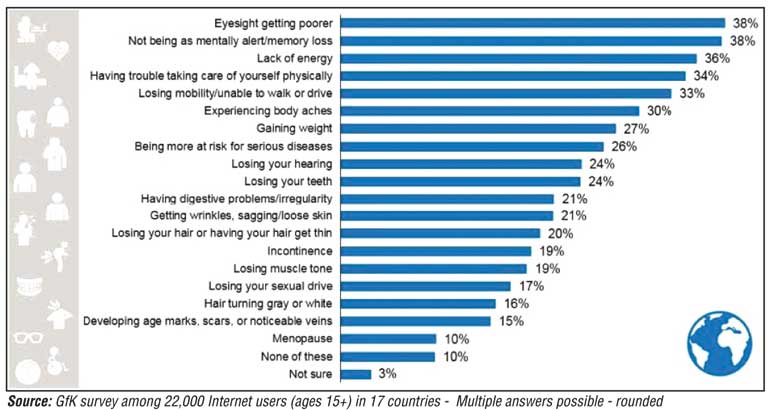Thursday Feb 19, 2026
Thursday Feb 19, 2026
Tuesday, 1 November 2016 00:03 - - {{hitsCtrl.values.hits}}
Internationally, the top five physical conditions that people worry most about having, either now or as they age, are eyesight getting poorer, not being as mentally alert, lacking energy, having trouble taking care of themselves physically, and being unable to walk or drive.
These are the findings from a GfK survey of the online population across 17 countries, which asked people which physical conditions they worry most about having, either now or as they age, from a list of 19 different conditions:
The study reveals how widespread certain concerns are within different countries and between genders – information that manufacturers and retailers can use to better target their product placement and advertising. For example, 38% of the international online population says “eyesight getting poorer” is a worry. But this rises to over half in Spain (53%), Mexico and Argentina (both 52%). Similarly, “not being as mentally alert” is a concern for 38% of people internationally, but is much wider concern in Spain (66%), Argentina (58%), Germany (52%), Mexico (51%) and Italy (50%).

Some countries also stand out as being more concerned about specific physical conditions compared to others. Russia is the only country surveyed where “losing your teeth” is a top five most popular concern, while in Japan and Korea “getting wrinkles or sagging skin” is in their top five. Japan also has “losing muscle tone” in their top five, which again does not feature in other countries’ top five.
Differences between men and women are also seen. Both genders have the same top five physical concerns around aging – although in slightly different order. However, looking further down the list, far more men than women worry about “losing sexual drive” (22% men; 11% women) – and far more women than men are worried about “getting wrinkles or sagging skin” (32% women; 11% men).
To download full findings for each of the 17 countries, please visit www.gfk.com/global-studies/global-study-overview/.